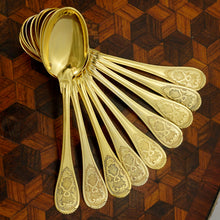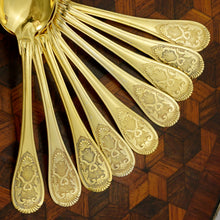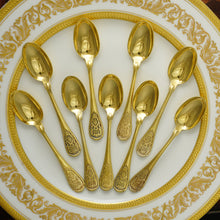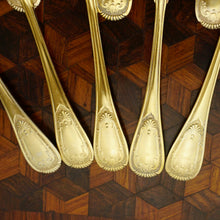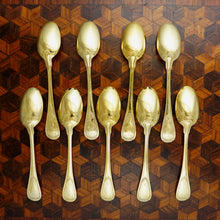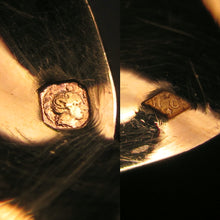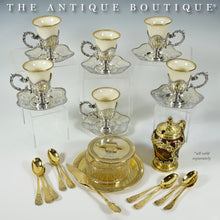
Antique French sterling silver & gold vermeil set of 9 demitasse teaspoons, spoons for coffee, moka or espresso. Featuring elegant handles patterned with scalloped shells and foliage. Richly enhanced in opulent gold vermeil finish. In overall good antique condition with some general wear commensurate with age and use. Fully hallmarked with the French Minerve 1st standard mark used from 1838, which depicts the goddess Minerva with a number 1 beside her to denote a silver content of 950/1000 (of 95% pure silver and a higher finesse than .925 sterling). Bearing maker's marks for Henin & Cie, this mark was in use from 1875 to the early 1900's. The spoons measure 4 1/8" length. Weighs 115.2 grams.
The Henin company were manufacturers of silverware, small table silver, and fine cutlery. The rich dynasty of the Henin family began in 1861 situated in the Haut Marais, at the heart of the historic city of Paris, at 9 rue des Enfants-Rouges. The Marais was the noted jewelry quarter. In this locality the nobility would go to buy luxurious jewelry and items made from high grade silver and gold. The pride of the gold & silver in the work of Henin was evident here. It was this pride and the high level of artistry that led to the most superb objects d’art being produced.
The Henin company would operate under various names over the course of its activity beginning as Thomas & Hénin from 1861 until 1865. Two days later, the company operated under a new name as Hénin Freres, until changing their name to Hénin & Fils in 1872. In 1875, the company again changed names, operating as Hénin & Cie and moving location to 33 rue des Archives, still within the Marais district. From 1891-1896, they switched names to Hénin & Vivier, before switching back again to Hénin & Cie. In 1933, the company became Maison Hénin.
In the late 1970's, the company faced serve financial problems and fell into bankruptcy. Much of the company's inventory, including models, dies, and drawings were auctioned publicly and scattered everywhere. Many of their designs were sold to Odiot, and still manufactured today by Odiot.






